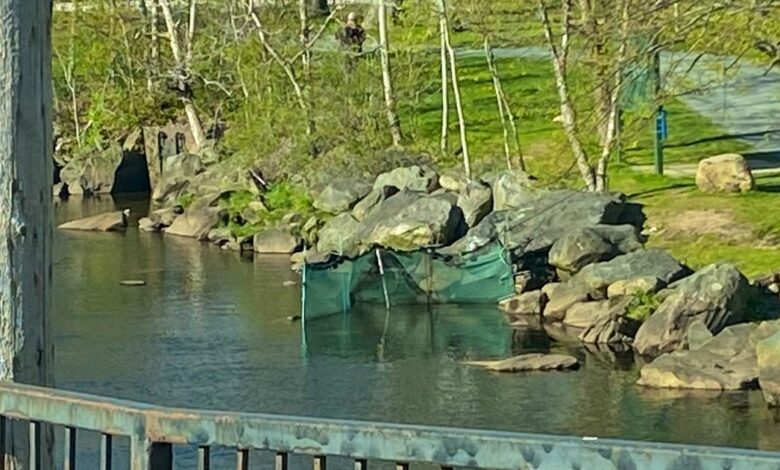Feds not prosecuting unlicensed elver fishing charges

Commercial elver licence holders were told Jan. 10 that the Public Prosecution Service of Canada won’t be prosecuting Fisheries Act charges laid against First Nations members for catching elvers without a licence approved by Fisheries and Oceans Canada.
“(The department told us the) Public Prosecution Service of Canada has said that they will not proceed with charges against First Nations until they have a meaningful share of the elver fishery,” said Brian Giroux, managing partner at the Shelburne Elver fishing co-operative.
The statement was confirmed by Stanley King of Atlantic Elver Fishery, who was also at the meeting, and by a transcript of the elver review meeting obtained by The Chronicle Herald.
It aligns with internal Fisheries and Oceans Canada correspondence during last year’s elver fishery obtained by The Chronicle Herald through a freedom of information request.
It would be a continuation of a policy by federal authorities that has coincided with large-scale overfishing of juvenile American eel and violence on rivers around Nova Scotia and New Brunswick.
The Public Prosecution Service of Canada refused to confirm or deny the policy.
“The PPSC assesses each case individually on its own merits and prosecutes offences under its jurisdiction in accordance with the PPSC Deskbook,” wrote Nathalie Houle, spokeswoman for the prosecution service.
Asked if the federal government had prosecuted anyone, aboriginal or non-aboriginal, for illegally harvesting, transporting or selling elvers in the past three years, she wrote: “The PPSC does not have any data readily available on this type of offence and our case management system does not contain the type of detail that would be required to extract any data.”
Fisheries and Oceans Canada stated that its officers made 60 Fisheries Act charges for the illegal harvest of elvers in 2023 and enforcement will continue in 2024.
“As in previous years, fishery officers will patrol rivers, facilities and export points, conducting surveillance, compliance verification and inspections and taking enforcement action when non-compliance with the regulations related to the elver fishery is found,” reads a written statement from the federal department.
“Fishery officers will continue to work with other agencies to combat the illegal harvest, sale and export of elvers.”
First Nations fishers contend they are seeking to implement their treaty right to earn a moderate livelihood off traditionally harvested resources.
First Nations currently have 27.61 per cent of the 9,960 kilogram total allowable catch.
However, of Nova Scotia’s 13 First Nations, only four have quota (We’koqma’q, Bear River, Acadia and Annapolis). Twenty-five years after the Supreme Court of Canada’s R vs. Marshall decision, which was over American eels, the majority of First Nations still don’t have access to the resource.
According to Fisheries and Oceans Canada internal communications, Millbrook First Nation and the Sipekne’katik First Nation issued their own licences last season.
In the absence of enforcement and with prices for 10-millimetre juvenile eels at about $5,000 a kilogram, increasing numbers of non-aboriginal poachers have taken to the rivers over recent years.
In 2020 and 2023, the fisheries minister shut down the season due to rampant poaching and violence on the rivers.
The elvers will begin arriving in just over a month and commercial harvesters are warning that officials are going with the same plan that didn’t work the past three seasons.
“(A Fisheries and Oceans Canada area chief) called me last season and told me that they were not enforcing the Fisheries Act during the last elver season because he could not do it to his guys again,” said King.
“They’d put a large effort in back in 2022, investigating and charging people, but there were no consequences. He was putting his men at risk for no reward because the PPSC would not prosecute or take the cases they generate. The consequence has been lawlessness.”
Elvers are shipped live to China, where they are raised to adulthood in aquaculture facilities primarily for the Japanese sushi market. The commercial industry estimates three times last year’s quota was caught and flown to China through seafood export terminals in Halifax and Toronto, but the Canada Border Services Agency didn’t find one elver.
Fisheries and Oceans Canada officers seized one shipment of elvers on April 5 at the Halifax Stanfield International Airport. Valued at $150,000, it belonged to the Kespukwitk First Nations (Acadia, Bear River and Annapolis) that did have quotas provided by the department.
The Assembly of Nova Scotia Mi’kmaw Chiefs issued a news release at the time blaming “an accounting error” and demanding the elvers be returned. (They had already been sold.)
“Following consultation with the Public Prosecution Service of Canada, charges were not laid in this case,” reads a written statement from the department.
“As per normal procedures when charges are not proceeded with, proceeds of the sale were returned to the individual from which they were seized.”
For its part, the department is conducting a review.
“DFO is conducting a broad, comprehensive review of the management of the elver fishery,” reads a written statement.
“The purpose of the review is to identify improvements to the management and enforcement of the fishery that will support the conservation of the American eel, and support a more predictable and orderly fishery. Grounded in a focus on conservation and reconciliation, the department is consulting with Indigenous communities, licence holders and other stakeholders to gain a comprehensive understanding of perspectives on the management of the fishery as part of the review.”




